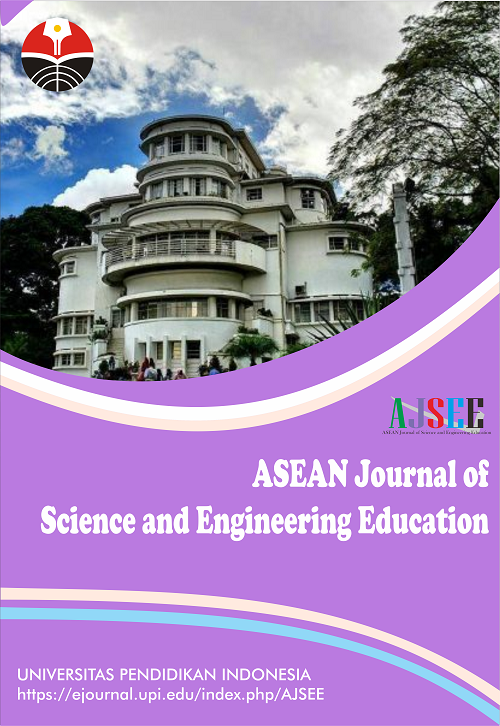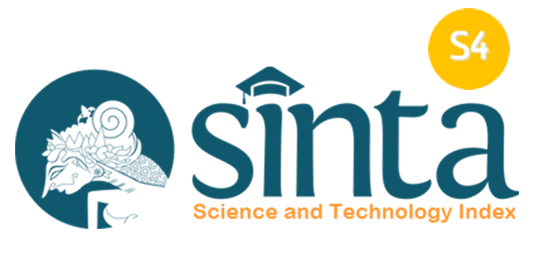Analysis of Experts' Opinion on the Human Excretory System Model for Teaching Biology in Nigeria
Abstract
Keywords
Full Text:
PDFReferences
Adegboye, M. C., Bello, G., and Abimbola, I. O. (2017). Conceptions of the nature of biology held by senior secondary school biology teachers in Ilorin, Kwara State, Nigeria. Malaysian Online Journal of Educational Sciences, 5(3), 1-12.
Akinfe, E., Olofinniyi, O. E., and Fashiku, E. O. (2012). Teachers’ quality as correlates of students’ academic performance in biology in senior secondary schools of Ondo State, Nigeria. Online Journal of Education Research, 1(6), 108-114.
Akinwumi, I. O., and Falemu, F. A. (2020). Effects of biology practicals on academic performance of secondary school students in biology in ikere local government area of Ekiti State, Nigeria. International Journal of Educational Research, 4(10), 10-23.
Anaeto, F. C. (2016). The roles of science and technology in national development. International Standard Journal Number (ISJN), 3(3), 38-43.
Auwalu, R. A., Mohd, E. T., and Muhammed, B. G. (2014). Academic achievement in biology with suggested solutions in selected secondary schools in Kano State, Nigeria. International Journal of Education and Research, 2(11), 215-224.
Babalola, E. O. (2022). Design and development of 3-dimensional model of human circulatory system to teach a concept of biology in senior secondary schools. Indonesian Journal of Teaching in Science, 2(1), 17-28.
Bisiriyu, A. A. (2016). Instructional materials as correlates of students’ academic performance in biology in senior secondary schools in Osun State. International Journal of Information and Education Technology, 6(9), 705-708.
Chavan, R. (2016). Difficulties in teaching biology concepts by science teachers at upper primary level. Aayushi International Interdisciplinary Research Journal, 3, 10–18.
Ganiyu, B., Adegboye, M. C., and Abimbola, I. O. (2017). Conceptions of the nature of biology held by senior secondary school biology teachers in Ilorin, Kwara State, Nigeria. Malaysian Online Journal of Educational Science, 5(3), 1-12.
Hamzat, A., Bello, G., and Abimbola, I. O. (2017). Effects of computer animation instructional package on students’ achievement in practical biology. Cypriot Journal of Educational Sciences, 12(4), 218.
Kola, A. J. (2013). Importance of science education to national development and problems militating against its development. American Journal of Educational Research, 1(7), 225- 229.
Olumorin, C. O., Babalola, E. O., Aladesusi, G. A., Issa, A. I., and Omolafe, E. V. (2021). Experts’ validation of the developed 3-dimensional automated model of the human heart to teach a biology concept in Ilorin, Nigeria. Indonesian Journal of Multidisciplinary Research, 1(2), 299-308.
Ong'amo, B. L., Ondigi, S. R., and Omariba, A. (2017). Extent of use of biology instructional resources and effect on students academic performance in secondary schools in Siaya Country-Kenya. International Journal for Innovation Education and Research, 5(1), 253-272.
Udu, D. A. (2018). Innovative practice in science educatiom: A panacea for improving secondary school students' academic achievement in science subjects in Nigeria. Global Journal for Educational Research, 17(1), 23-30.
Usman, N., and Saminu , I. (2017). Effect of Improvisation of instructional materials on learning biology concepts by secondary school students in charanchi local government area of Katsina State. Gombe Technical Education Journal, 10(1), 1-14.
DOI: https://doi.org/10.17509/ajsee.v3i1.45457
Refbacks
- There are currently no refbacks.
Copyright (c) 2022 Universitas Pendidikan Indonesia

This work is licensed under a Creative Commons Attribution-ShareAlike 4.0 International License.













